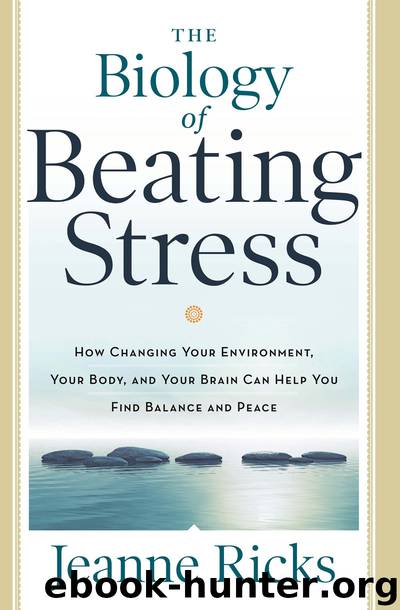The Biology of Beating Stress by Jeanne Ricks

Author:Jeanne Ricks
Language: eng
Format: epub
Publisher: Career Press
Published: 2014-05-21T04:00:00+00:00
Exercise and What to Eat, When?
Remember, when you don’t have proper nutrition, and when you don’t feed yourself, it puts your body under stress to function optimally, which will contribute subliminally to any other stress you may have. So, when it comes to exercise and the questions become, “To eat or not to eat?” and “Before or after?” the answer is both!
Before
The research is in and it shows that exercising after short-term fasting (such as before breakfast) may increase the amount of fat you burn. On the other hand, eating a meal that stimulates a low blood glucose response prior to exercise may also boost your body’s actual use of body fat (instead of glucose). Research further shows that if you exercise for longer than 60 minutes without supplying your body with any nutrients, you will actually burn fewer calories and even less fat than if you had eaten, and your post-exercise metabolic rate (or rate of calorie burning) is also lower.
You’ve got several factors to consider, including how long you exercise, your type of exercise, your exercise experience, and health factors that may play a role in how you process food. That said, you know that if you eat, you need to also allow time for that food to digest before exercising (otherwise you’ll cramp). Also, you know that more time is needed before more intense activities.
» Large meal: more than 3 to 4 hours.
» Small meal: 2 to 3 hours.
» Liquid meal: 1 to 2 hours.
» Light snack: less than 1 hour.
When you consider the amount of time that it takes to digest even a light snack, you can easily conclude that the majority of the “fuel” that you’ll use during most exercise is not coming from the food you have just eaten. Nope. You’re using glycogen and fat that was already stored in your muscles, liver, and fat cells.
Usually, you’ll have enough of that stored fuel to last for one to two hours of intense to very intense work or three to four of moderate intensity. So technically, you’re covered without eating. But, when you don’t eat at all, you then risk breaking down muscle and causing a great deal of stress to your body during exercise.
Keeping all of what we’ve just reviewed in mind, doesn’t it just make sense to have a regular meal four hours prior to your workout, followed by a small 200-calorie snack one hour before you exercise?
Keep it light. Pre-workout you don’t want to have large amounts of proteins and fats (even if they’re healthy proteins and fats) because these types of fuel take a longer time to digest and will pull precious oxygen and energy-delivering blood to your stomach and away from your exercising muscles. They also carry a greater risk of giving you stomach cramps during exercise.
Choose whole foods, not sports drinks, energy bars, or powders, which will only add hazardous toxins, chemicals, useless calories, sugar, and caffeine to your diet. Hydrate with filtered water. Have at least 16 ounces two hours earlier and another 8 ounces 10 to 20 minutes right before exercise.
Download
This site does not store any files on its server. We only index and link to content provided by other sites. Please contact the content providers to delete copyright contents if any and email us, we'll remove relevant links or contents immediately.
Happiness by Matthieu Ricard(3040)
How to Stop Worrying and Start Living by Dale Carnegie(2716)
Getting Things Done by David Allen(2691)
The Chimp Paradox by Peters Dr Steve(2383)
What I Need by J. Daniels(2076)
The Empath's Survival Guide by Judith Orloff(2057)
The Finnish Way by Katja Pantzar(1996)
The Smartest Kids in the World by Amanda Ripley(1855)
Jealousy by Osho(1749)
The Joy of Hygge by Jonny Jackson(1736)
Everything in Its Place by Dan Charnas(1735)
Who Moved My Cheese?: An Amazing Way to Deal With Change in Your Work and in Your Life by Johnson Spencer(1644)
Free Yourself from Fears by Joseph O'Connor(1636)
Don't Sweat the Small Stuff at Work by Richard Carlson(1558)
Think Happy to Stay Happy by Becca Anderson(1515)
How to Build Self-Discipline to Exercise by Martin Meadows(1507)
Coping with Anxiety by Edmund Bourne & Lorna Garano(1502)
The Secret History of Freemasonry by Paul Naudon(1492)
Expectation by Anna Hope(1460)
